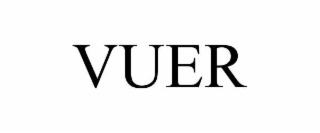Trademark Overview
On Friday, September 19, 2025, a trademark application was filed for VUER with the United States Patent and Trademark Office. The USPTO has given the VUER trademark a serial number of 99401756. The federal status of this trademark filing is NEW APPLICATION - ASSIGNED TO EXAMINER as of Wednesday, February 11, 2026. This trademark is owned by FortyFive Labs Incorporated. The VUER trademark is filed in the Computer & Software Products & Electrical & Scientific Products and Computer & Software Services & Scientific Services categories with the following description:
Downloadable software for simulation, visualization, and interaction with physics-enabled 3D environments; downloadable tools for robotics, artificial intelligence, and machine learning model development; downloadable virtual environments for use in training and testing control algorithms; downloadable software for managing datasets and annotations related to 3D scenes and synthetic data; software for generating, manipulating, and labeling photorealistic simulated data; downloadable software featuring generative world models for creating dynamic, procedural 3D environments and scenarios; downloadable APIs and SDKs for real-time 3D simulation and rendering; downloadable generative models for synthesizing realistic physics simulations, object interactions, and environmental conditions; all for use in scientific research, software development, robotics engineering, and virtual testing.
Providing temporary use of non-downloadable software for simulating and visualizing interactive 3D environments; platform as a service (PaaS) featuring tools for training and evaluating robotics and machine learning models in synthetic scenes; cloud-based generative world model services for creating, modifying, and deploying procedural simulation environments; providing an online platform for dataset creation, labeling, and automated data pipelines; design and development of software tools for photorealistic rendering, simulation scripting, and procedural generation of assets; hosting and deployment of generative AI models for world simulation, scene generation, and predictive physics modeling; software hosting services for collaborative experiment tracking, visualization, and version control in robotics and AI applications; providing online non-downloadable software utilizing generative models to create diverse training scenarios and edge cases for robot learning.
